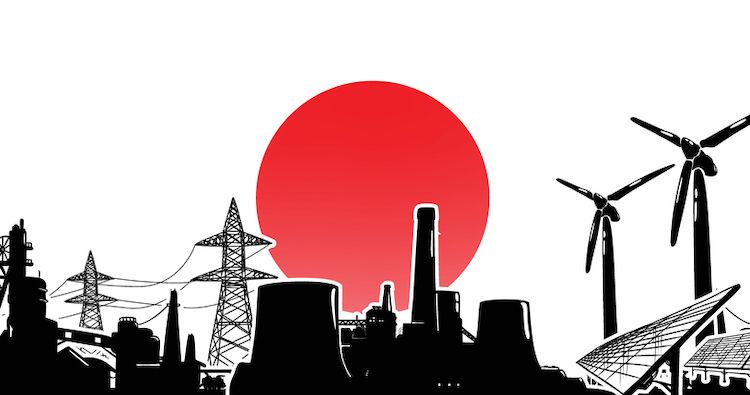Japan’s Ministry of Economy, Trade and Industry (Meti) has announced plans to boost offshore wind by 1,000MW per year from 2021 to 2030, as pressure grows to accelerate the nation’s low-carbon transition, the Nikkei has reported.
The government’s Basic Energy Plan, which outlines its energy mix targets, has been criticised as unambitious.
By 2030, Japan is targeting that 22-24% of its electricity will come from renewable energy, while 26% will be supplied by coal-fired power, the Renewable Energy Institute, an organisation founded by Masayoshi Son, noted.
In 2018, Japan generated 18% of its electricity from renewable sources, including 8% hydropower, according to the Institute.
Keidanren, Japan’s business lobby, as well as the Japan Climate Leaders’ Partnership (JCLP), a corporate coalition, have both urged the government to increase investments in, and incentives for, renewable energy as part of a response to the coronavirus crisis.
Proposals
In its latest policy proposal last month, Keidanren called on the government to establish an investment environment which will contribute to achieving decarbonisation in the post-corona era.
“As part of these efforts, we will work towards steady progress in institutional reform aimed at creating an advanced and resilient electrical power system and making renewables Japan’s main source of power,” Keidanren stated.
In a proposal from June, JCLP suggested the government set a 50% renewable energy target for the power grid by 2030.
It wrote: “To this end, we call on the government to direct a flow of investment to the transmission and distribution network at a scale compatible with the target of 50% renewable energy by 2030, ensuring fair and equitable costs for all citizens.”
Additionally, JCLP suggested that the government further stimulates corporate investment in renewable energy, for example by enabling corporate power purchase agreements.
JCLP told Expert Investor that it met with the state minister of economy, trade and industry, Hideki Makihara, to discuss a green recovery in detail.
“He was eager to receive input from companies on two points: examining measures to introduce renewable energy at a large scale and revitalising the economy by advancing technologies that support decarbonisation,” JCLP commented.
However, as of today, Japan’s stimulus is skewed towards brown investments, according to a research by Vivid Economics, a UK economics consultancy.
Japan has passed a total of $2.17trn (€1.9trn) in fiscal measures as a response to covid, but, to date, it has not announced any specific ‘brown’ or ‘green’ policies, the consultancy said.
Coal policy
The corporate push for renewable energy comes as discussions about phasing out coal increase.
The Renewable Energy Institute wrote in a comment that the minister of economy, trade and industry, Hiroshi Kajiyama, announced at a press conference that Japan will proceed with the closure of low-efficiency coal-fired power plants domestically.
The government also said recently that it would in principle not “support new export of coal-fired power plants” as part of its strategy for overseas infrastructure development.
But the Renewable Energy Institute explained that the domestic and overseas plans either maintain support for high-efficient coal-fired power or leave loopholes.
These ‘clean coal’ and high-efficient plants can only reduce carbon dioxide emissions by a few percent more than the ‘inefficient’ ones, it added.
Teruyuki Ohno, executive director at the Renewable Energy Institute, commented: “The announced policy indicates that while there is a strong persistence of coal-fired power, there are growing calls for stronger decarbonisation policies within the government.”







